Chinese New Year in Bangkok is a festival that bathes the capital in a sea of red and gold.
The Chinese New Year has a special place in the Thai capital and attracts visitors from all over the world who want to experience the spectacle.
In this article, we take you on a journey through the streets of Bangkok during the Chinese New Year.
Explore the historic Chinatown district, marvel at the lavishly decorated shopping centers and visit the temples where the holiday is traditionally celebrated.
From traditional customs, bustling parades and culinary delights to the unique atmosphere in the city: the holidays will be a unique experience for you too.
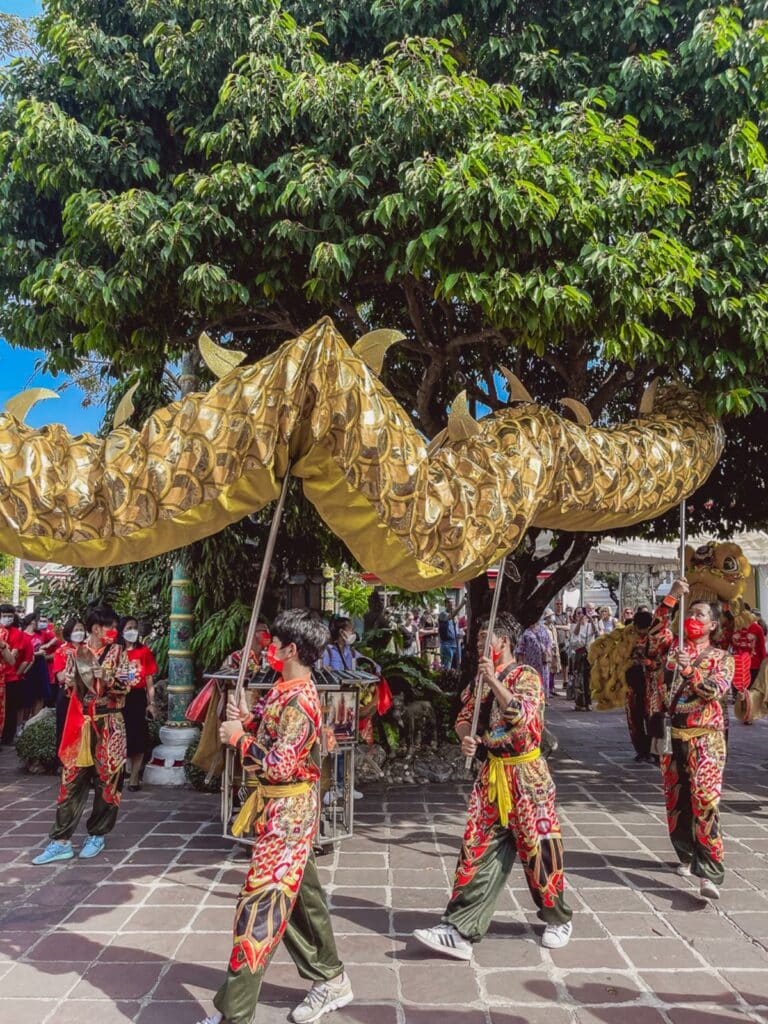
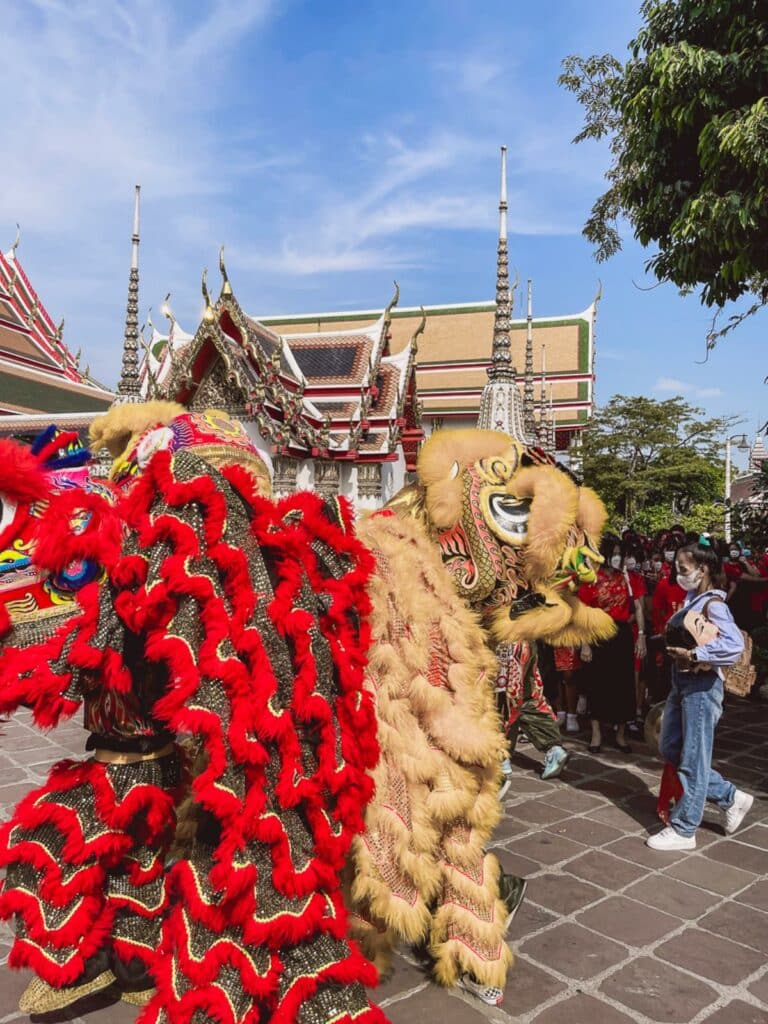
What exactly does Chinese New Year mean?
The Chinese New Year, also known as the Spring Festival, is one of the most important and most celebrated festivals in Chinese culture and is celebrated by millions of people worldwide.
The traditional festival, which has its origins in ancient Chinese civilizations, marks the beginning of a new year according to the lunisolar Chinese calendar and typically falls between the January 21 and February 20.
Tip: Book a guided tour of the main sights of the city to learn more about the history of Bangkok.
Meaning and origin of the Chinese New Year
The roots of the Chinese New Year lie in the worship of gods and ancestors, which also involves driving away evil spirits.
It is a time of family, renewal and hope. According to legend, the festival began with the fight against the mythological monster Nian, which is said to haunt villages on New Year’s Day.
To ward off Nian, people placed food in front of their doors and used fireworks to drive the monster away – customs that have endured to this day.
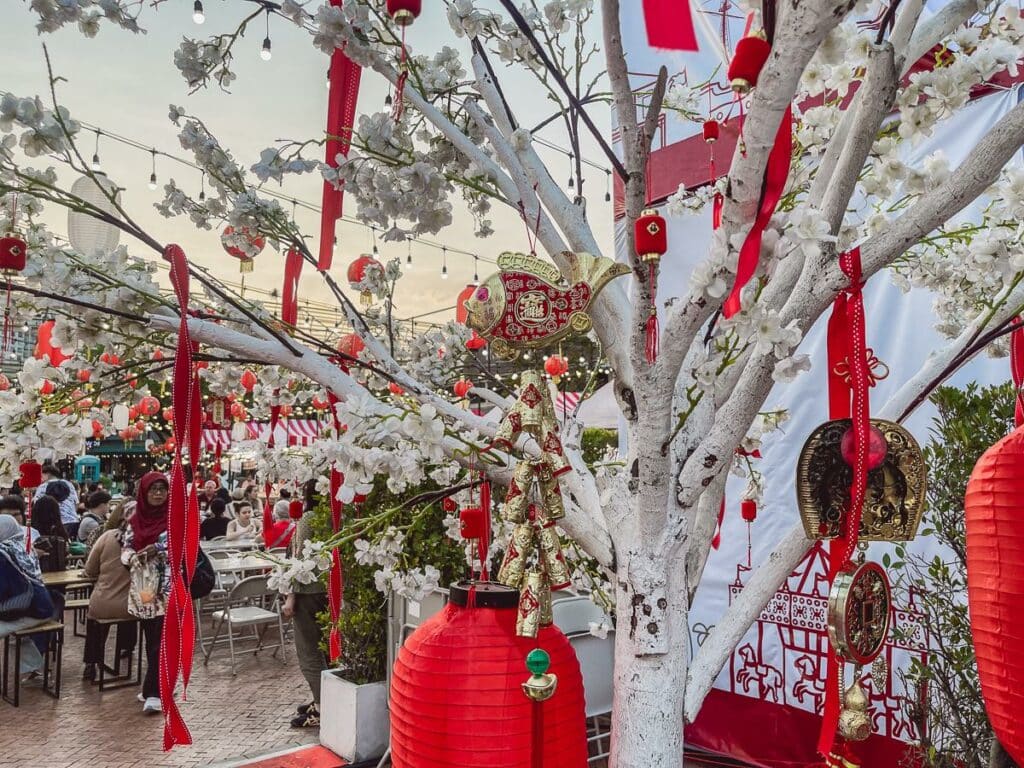
Traditions and celebrations for the Chinese New Year
The Chinese New Year is characterized by various customs and rituals that may differ from region to region, but have some common elements:
- Cleaning and decoration: Before New Year’s Day, families clean their homes thoroughly to drive away bad luck and evil spirits and welcome in the New Year. Houses are decorated with red lanterns and calligraphy symbolizing luck and prosperity.
- Family reunions: New Year is a time for families to come together, often at a festive dinner on New Year’s Eve. It is perfectly normal for people to travel long distances to celebrate with their loved ones.
- Red envelopes: One of the best-known traditions is the giving of red envelopes, called “hongbao”, which contain money and are given by older family members to younger ones as a sign of a wish for happiness and health.
- Fireworks and dragon dances: Fireworks are set off everywhere to drive away evil spirits and welcome in the New Year. Dragon and lion dances, which symbolize luck and strength, are also popular events.
While Chinese New Year is deeply rooted in tradition, the celebrations have evolved over time to include modern elements such as online New Year greetings and urban events with light shows and concerts.
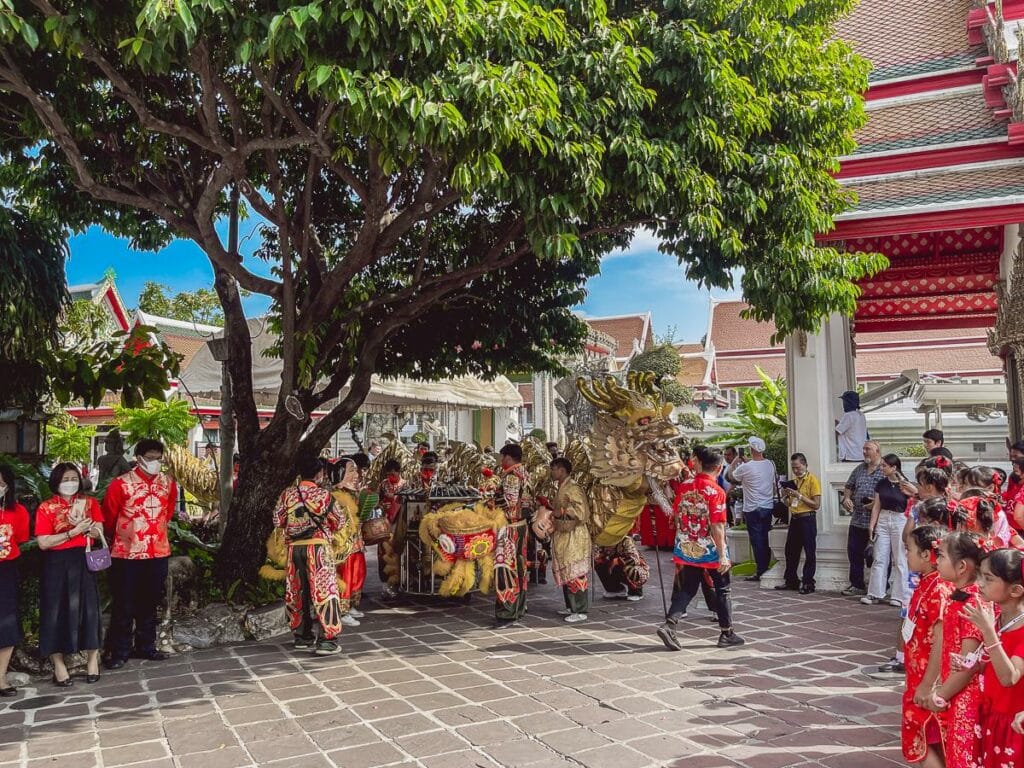
Culinary traditions for the Chinese New Year
The festival is also a time of culinary indulgence, when certain dishes are served that symbolize happiness and prosperity.
These include fish (for abundance), sticky rice cakes (for a higher position in the coming year) and long noodles (for longevity).
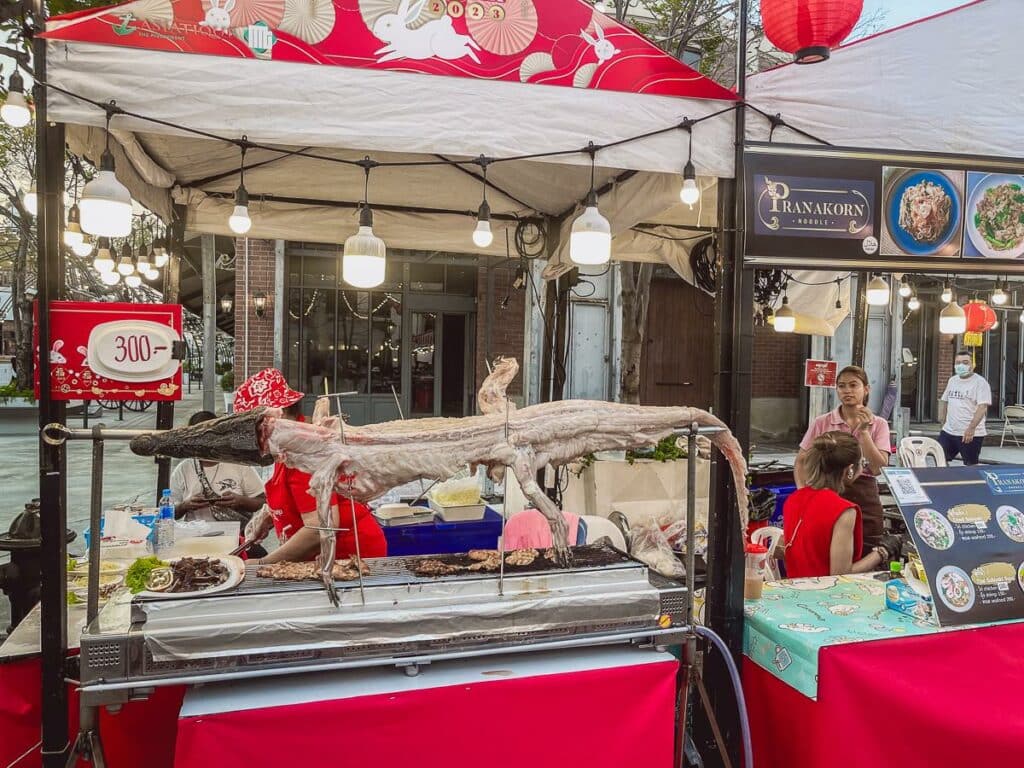
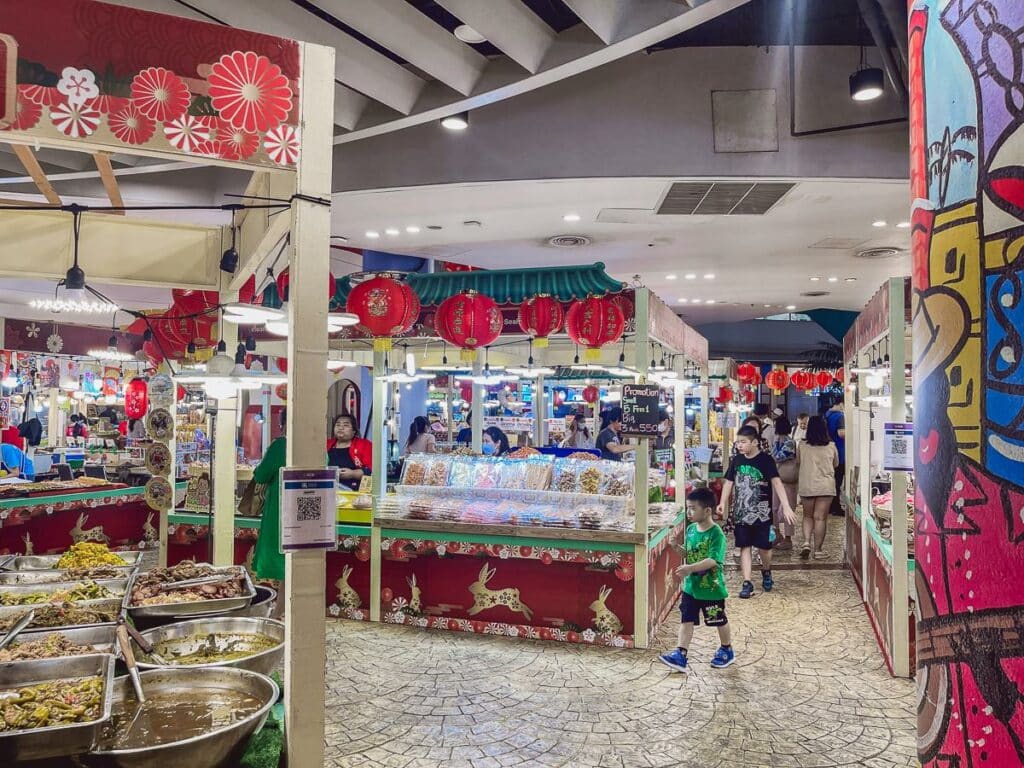
The sign of the zodiac
Each Chinese New Year is assigned to one of twelve signs of the zodiac, which rotate in a 12-year cycle.
Each animal has its own legends and character traits that are attributed to the people born in that year.
The Chinese New Year begins in 2024 on February 10 and is marked by the wooden dragon.
Tip: This private tour of the city’s most important temples also takes you to Wat Arun, Wat Pho and the palace.
How is Chinese New Year celebrated in Bangkok?
Chinese New Year is one of the liveliest and most colorful times in Bangkok.
Here we tell you how Chinese New Year is celebrated in Bangkok and why it’s an event you shouldn’t miss.
Important to know: The major Chinese New Year events in Bangkok focus almost exclusively on the three-day New Year period itself.
The three main days of the festival include the eve of the Spring Festival, then the Spring Festival or New Year, followed by New Year’s Day.
However, smaller events take place until the 15th day of the new lunar year, the so-called Lantern Festival.
In the western calendar, the celebrations begin on February 10 and continue until February 24.
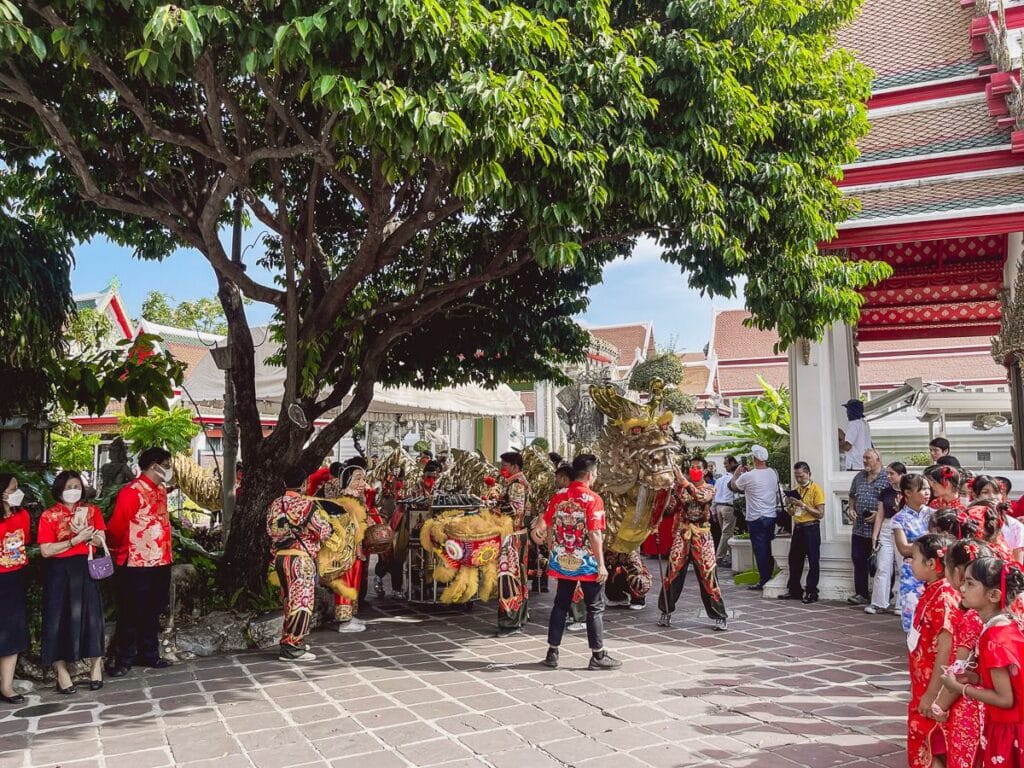
The significance of the Chinese New Year in Bangkok
Bangkok is home to a relatively large Chinese community. So it’s no wonder that the Chinese New Year is welcomed with open arms.
In fact, the holiday is celebrated in a big way (not only) by Thai people of Chinese descent to demonstrate their deep cultural connection to China.
The celebrations offer locals and visitors alike the opportunity to immerse themselves in the exciting Chinese culture and welcome the New Year with hope and joy.
Tip: This Bangkok street food tour takes you to Chinatown, where you’ll learn more about the neighborhood’s history and food scene from your local guide.
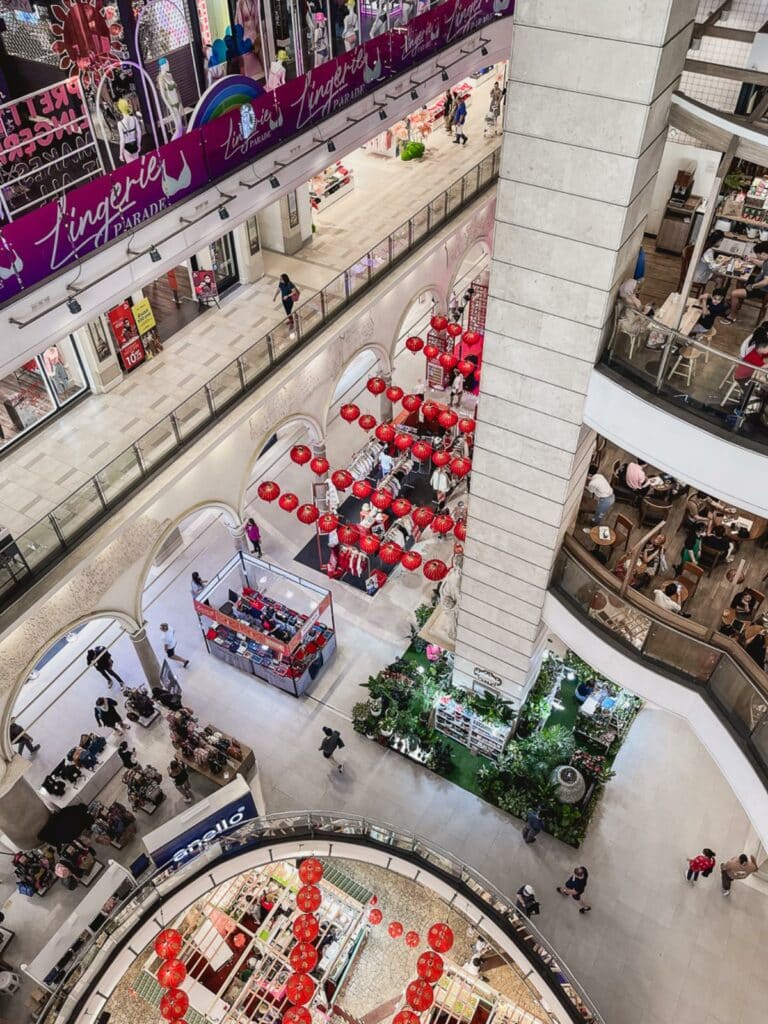
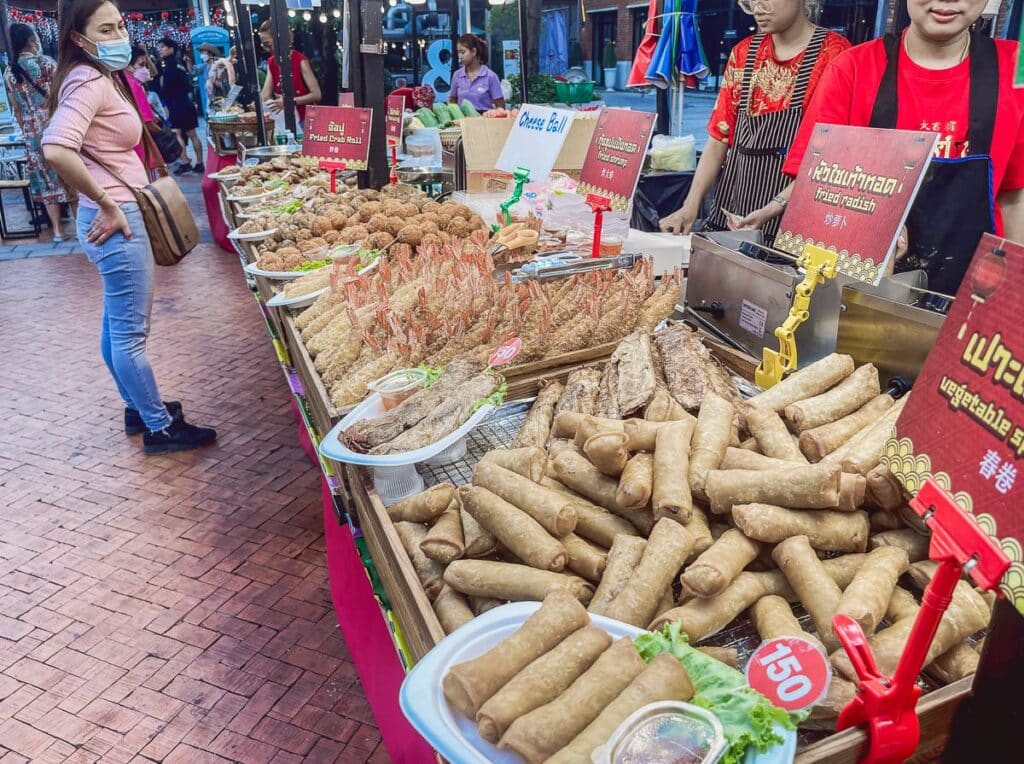
Chinatown (Yaowarat): The heart of the festivities
Yaowarat, Bangkok’s vibrant Chinatown, is the center of the New Year celebrations.
The streets are bathed in a sea of red lanterns and bright decorations, and the air is filled with the sounds of traditional music and the smell of delicious street food.
A wide variety of activities, shows and parades await you here, from dragon and lion dances to cultural performances and ceremonies.
The celebrations begin with ritual acts to attract good luck and prosperity.
Many visit temples to pray and make offerings.
Wat Mangkon Kamalawat, the largest and most important Chinese temple in Bangkok, attracts thousands of worshippers who come to pray for a happy and prosperous year.
Getting there: By MRT (Blue Line) to Wat Mangkong or Sam Yot, alternatively by cab.
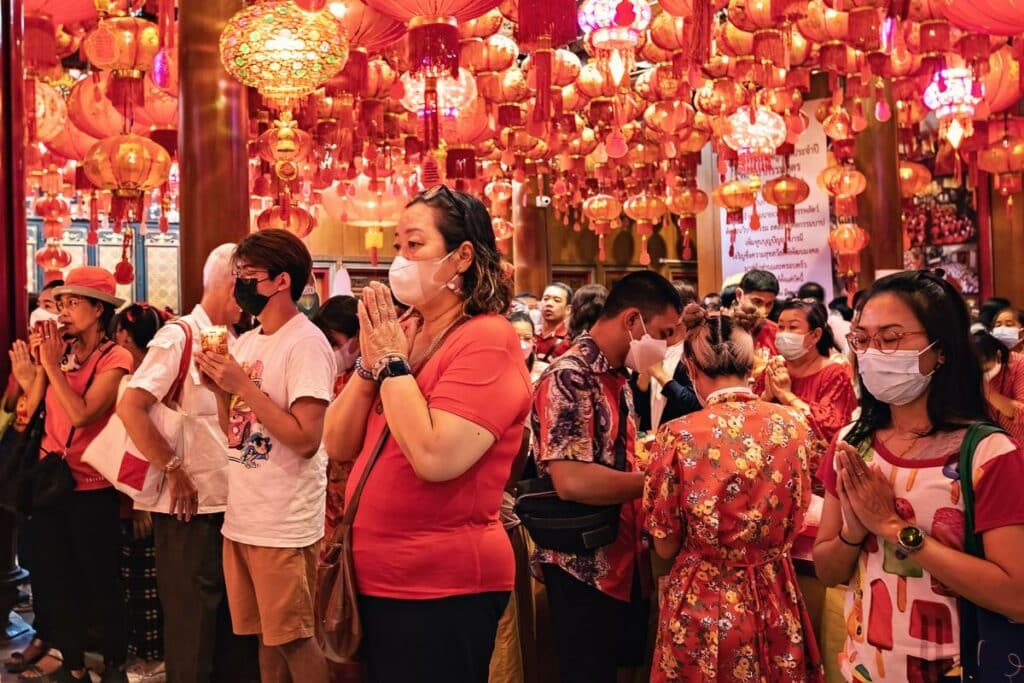
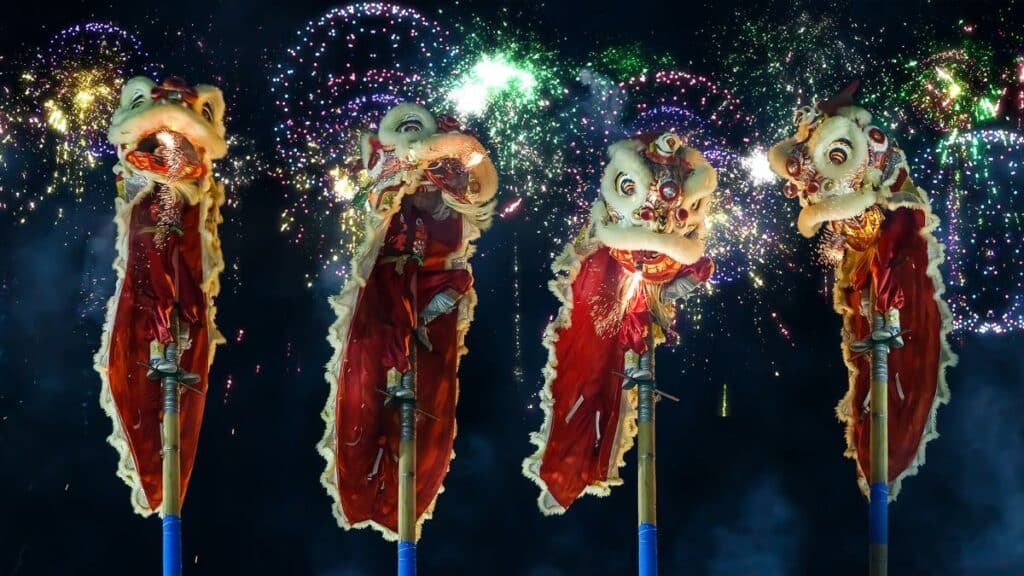
How is the Chinese New Year celebrated in Yaowarat?
It is often not so easy to get specific information about the planned Chinese New Year celebrations in Chinatown Bangkok.
But they definitely take place every year and it’s often the most fun to simply be surprised.
The Spring Festival itself is a particularly big celebration. But all hell also breaks loose in Yaowarat on the eve of the Spring Festival and New Year.
The lanterns and decorations remain hung along Yaowarat Road for at least 15 days after the New Year – i.e. until the Lantern Festival.
Important to know: On the main day of the Chinese New Year, traffic is closed on the entire Yaowarat Road.
So it’s best to take the subway or have the cab driver drop you off a block away.
Tip: Immerse yourself in the history and sights of Bangkok’s Chinatown on this guided walking tour.
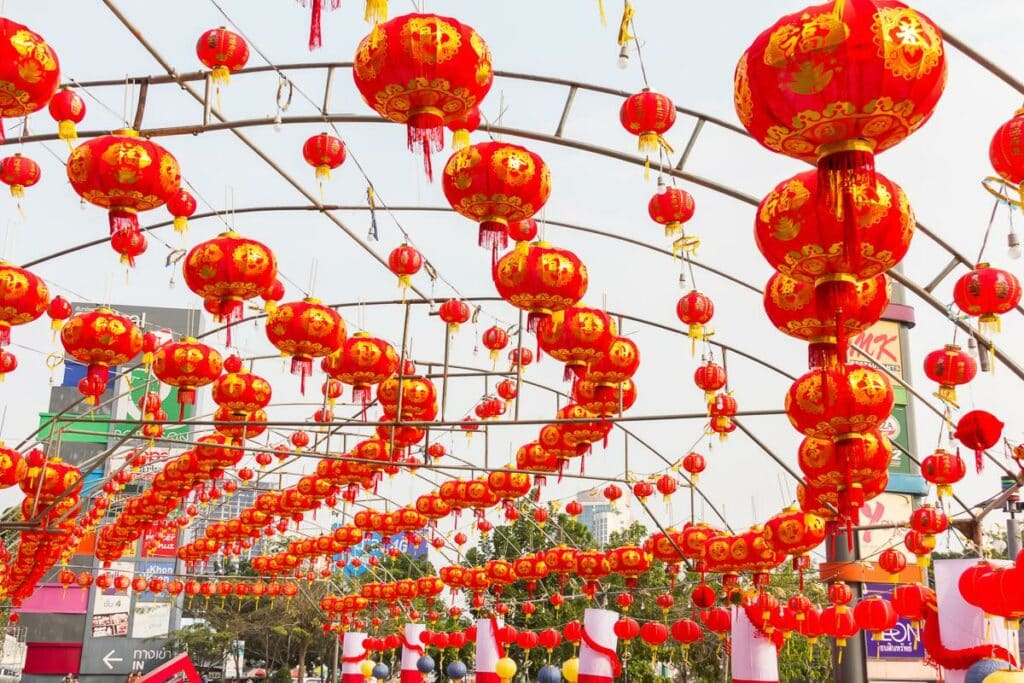
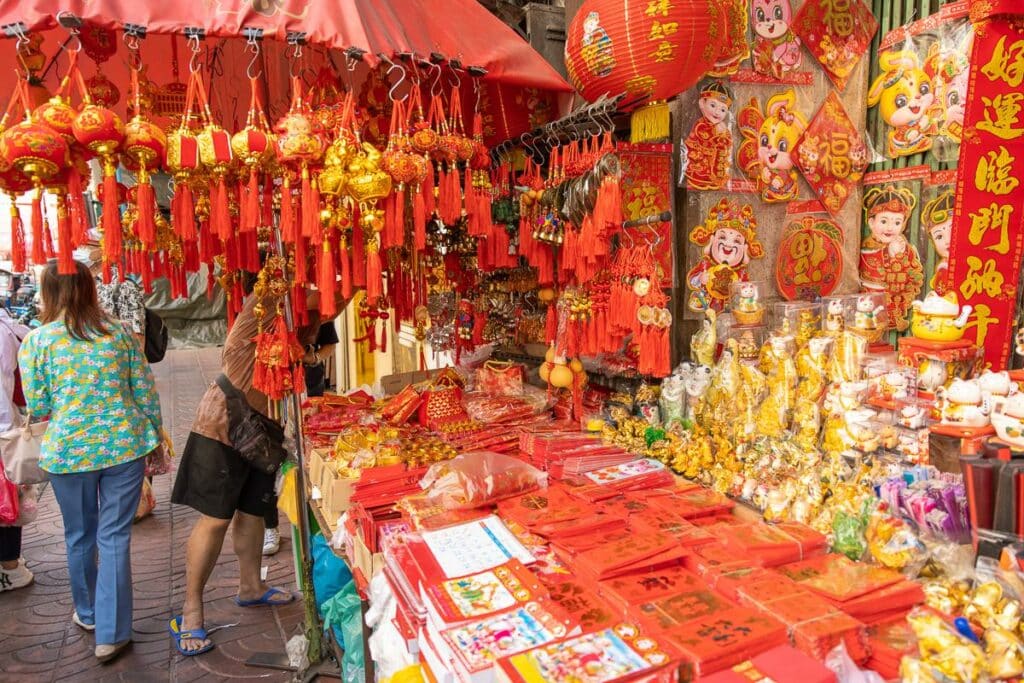
When and where is the Chinese New Year celebrated in Chinatown?
In recent years, the Spring Festival Day celebrations in Bangkok’s Chinatown have been held at approximately the following times (variations possible):
- The official start of the celebrations is at 12 noon. However, everything is already prepared by 10 o’clock in the morning.
- The first kite parade starts at 3 pm on Yaowarat Road.
- The fan dance takes place at 17:45.
- The Golden Dragon Dance starts at 7 pm.
- Another fan dance begins at 20:20.
- At 8:30 pm, traditional Thai dancers and singers perform on stage near the Chinatown Gate.
- The kite parade with LED lights takes place at 21:30.
- At 22:50 there is a traditional drum solo.
- “Xin Nian Hao” or “Happy New Year” is of course shouted at midnight.
Typically, a member of the Thai royal family is part of the Golden Dragon Dance and is cheered on loudly.
After dark, all the Chinese lanterns are lit, which makes the celebration even more beautiful.
Yaowarat is also transformed into a huge open-air kitchen serving traditional Chinese dishes.
Highlights include steamed fish dishes, which symbolize prosperity, sticky rice cakes (Nian Gao), which stand for a higher income or a better position in the coming year, and dumplings, which are said to bring good luck.
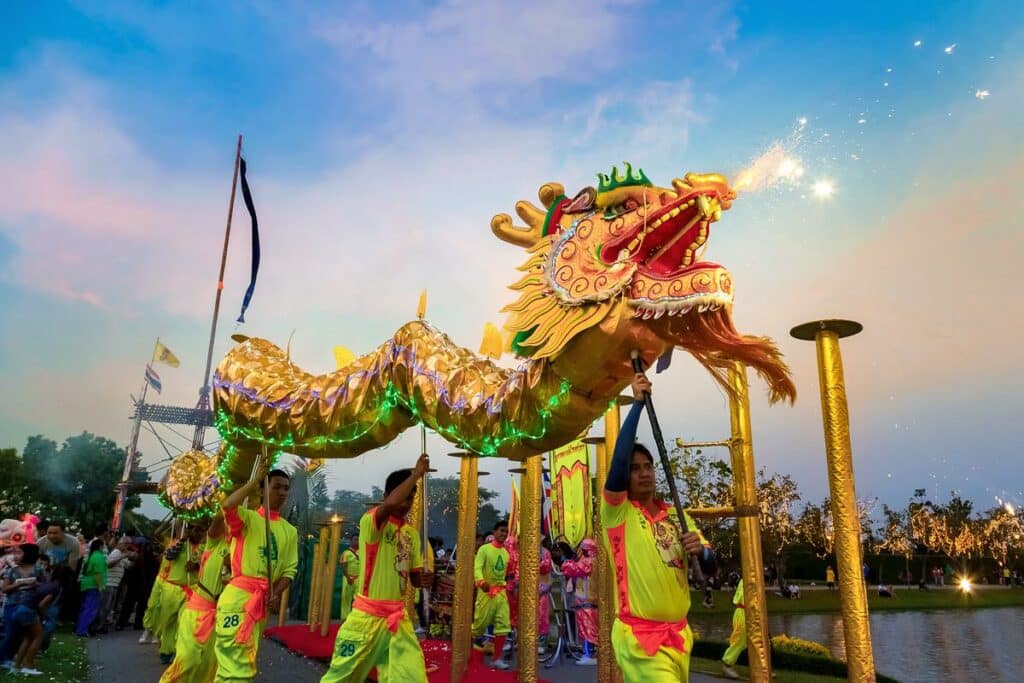
Where else is the Chinese New Year celebrated in Bangkok?
If the noise and bustle of Yaowarat Road (Chinatown) is too much for you, you can also experience Chinese New Year in most of the city’s temples.
Some of the larger temples are traditionally visited by Thai princesses and are lavishly decorated before their arrival.
Great places to visit for the Chinese New Year in Bangkok include Wat Pho, Wat Arun and the Mang Nguan Ha Shrine, which is located directly in front of Princess Mother Park.
The temples are particularly beautiful at dusk, as they are brought to life by countless lanterns during the Chinese New Year.
You can also find great decorations, special offers and even performances and shows in the city’s larger shopping malls – for example in Terminal 21 Mall or Siam Paragon.
The huge open-air shopping center Asiatique The Riverfront also has a lot to offer for the Chinese New Year in Bangkok.
One final tip: many restaurants in Bangkok offer special menus for Chinese New Year, often with dumplings, fish and the traditional sticky rice cakes.
You should definitely reserve a table here in good time, as places are often fully booked well in advance.
Tip: This guided tour through Chinatown shows you the most exciting corners of the district.
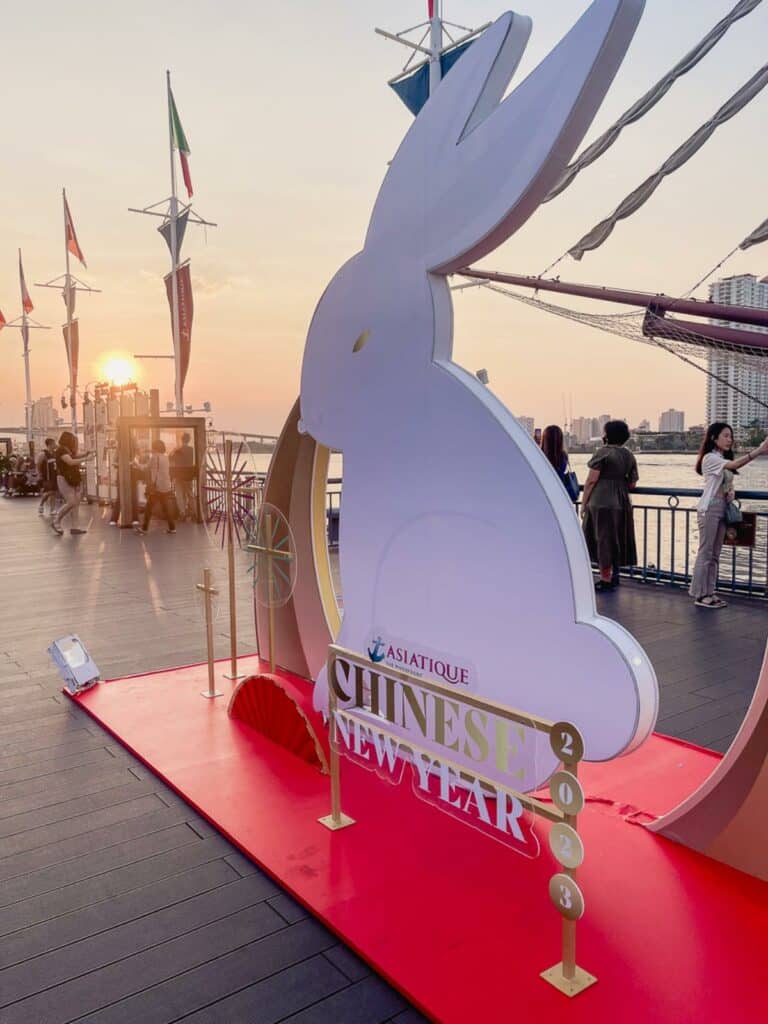
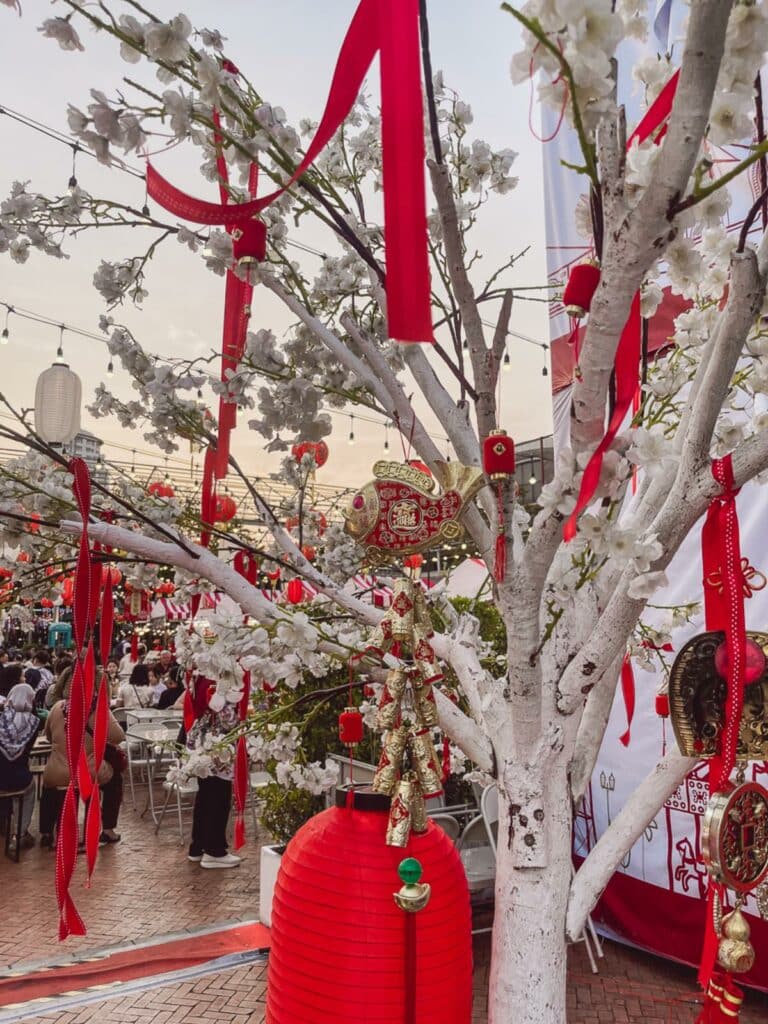
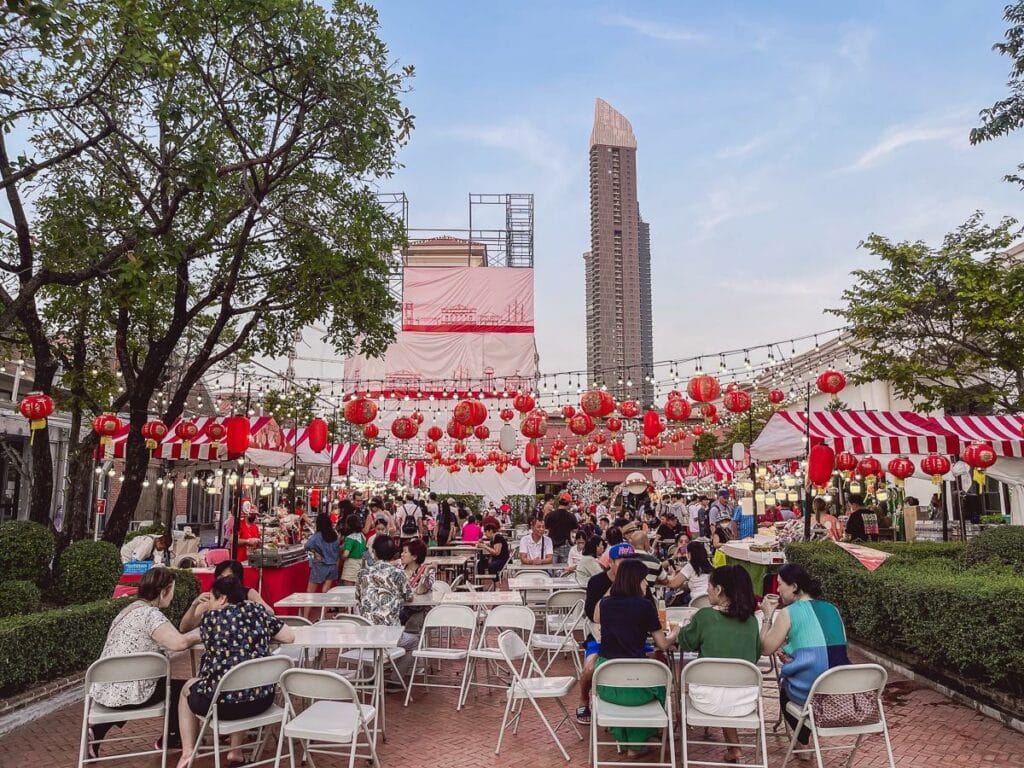
Frequently asked questions about Chinese New Year in Bangkok
Finally, we will answer some frequently asked questions about Chinese New Year in Bangkok.
When is the Chinese New Year celebrated in Bangkok?
The Chinese New Year falls on the new moon between January 21 and February 20. The exact day changes every year – in 2024 it is February 10.
Where do the main Chinese New Year celebrations take place in Bangkok?
The most spectacular celebrations take place in Bangkok’s Chinatown, known as Yaowarat. There you can experience traditional events, street markets and parades.
Can anyone celebrate Chinese New Year in Bangkok?
Yes, the celebrations are open to everyone, regardless of their origin. Chinese New Year in Bangkok is a wonderful opportunity for visitors to experience the rich culture and tradition.
What are the special highlights during Chinese New Year in Bangkok?
Highlights include dragon and lion dances, cultural performances, fireworks and visits to temples to pray for good luck and prosperity in the new year.
Do I have to pay an entrance fee for events during Chinese New Year in Bangkok?
Most street events and parades are free of charge. However, some special events or attractions may charge admission.
What should I wear for Chinese New Year in Bangkok?
Red is the traditional color of good luck in Chinese New Year, so it is customary to wear red clothes to attract good luck and happiness.
Are there any special dishes I should try for Chinese New Year in Bangkok?
Yes, traditional dishes such as dumplings, moon cakes, sticky rice cakes (Nian Gao) and fish dishes, which symbolize prosperity and good fortune, are particularly popular.
Are stores and attractions open during Chinese New Year in Bangkok?
Most stores and restaurants are open, but some may be closed during the first few days of the festival.
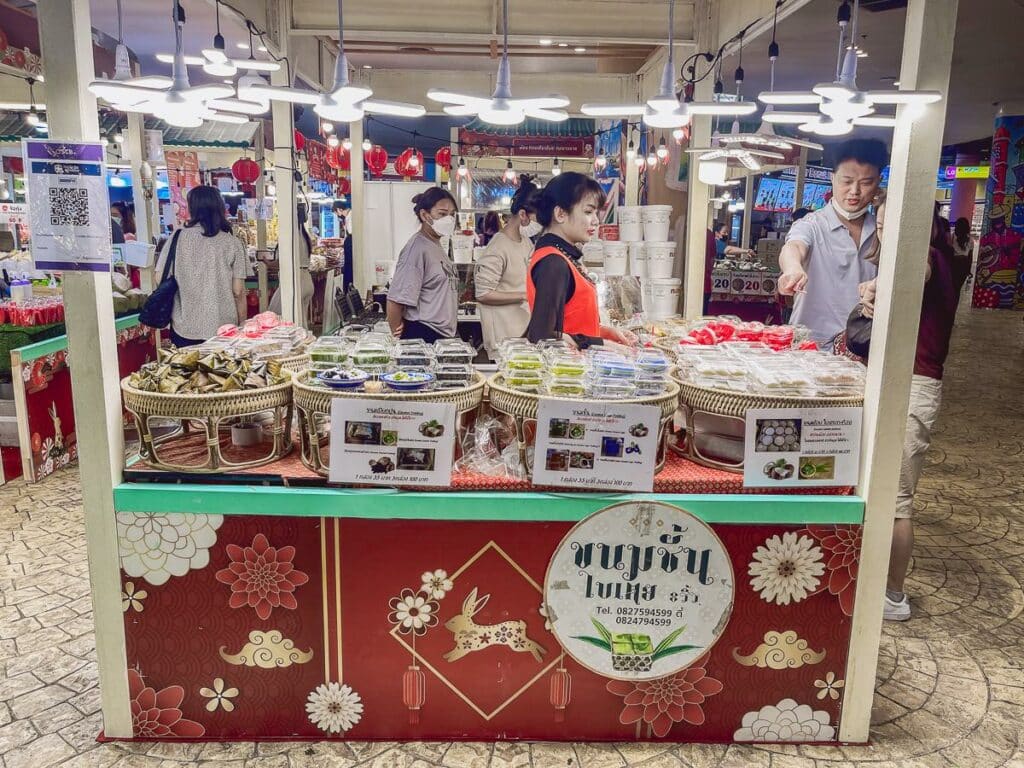

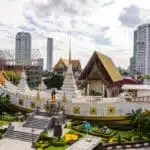
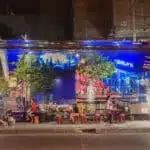
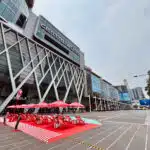
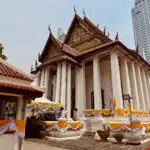
Leave a Reply